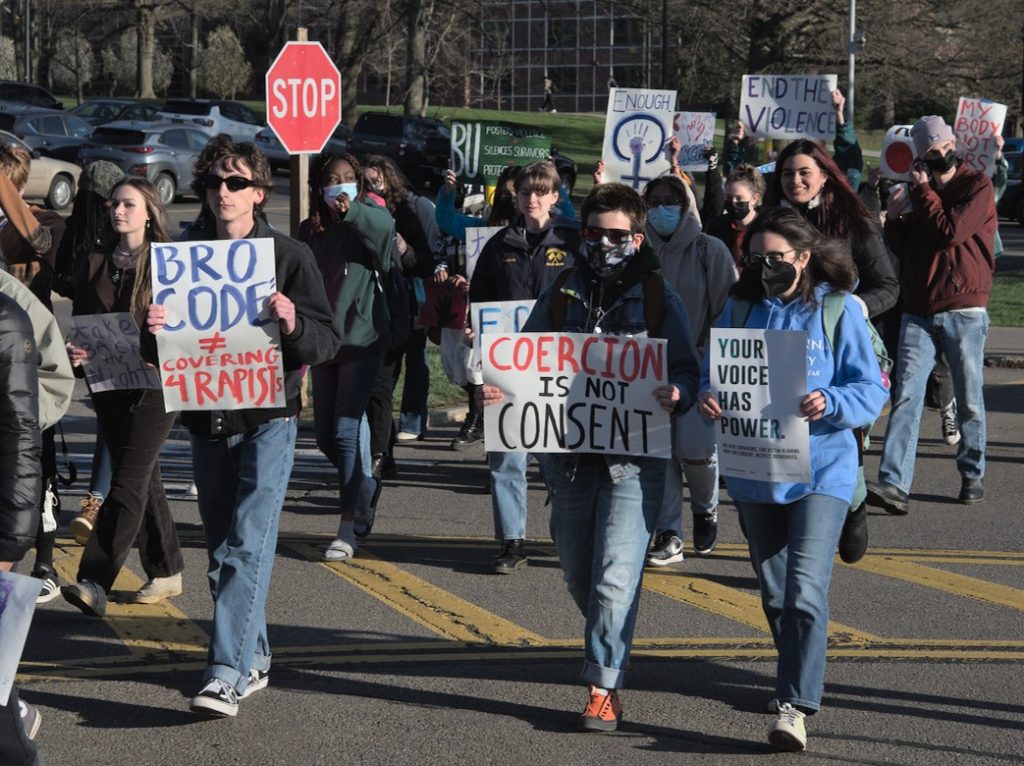Binghamton University students took to the streets to protest against rape culture this past Thursday.
As part of Sexual Assault Awareness Month, the Women’s Student Union (WSU) at BU held their annual Week of Action against sexual and interpersonal violence from April 25 to April 29. Various events were held during the week to raise awareness for survivors and speak out against sexual assault. The “Take Back the Night” rally is an annual event intended to empower survivors that takes inspiration from various rallies of a similar nature that date back as far as the 1970’s. Since then, the Take Back the Night Foundation has become an organized front for establishing and supporting these rallies.
The Take Back the Night Foundation is a global coalition and initiative against sexual and interpersonal violence that supports college campuses in different parts of the world. Founded in 2001 by Katie Koestner, the foundation’s goal is to take action against and end all types of sexual violence. In pursuit of this goal, it has supported over 300 events that have taken place in the years since its inception.
The “Take Back the Night” rally was held on Thursday, April 28 on the Peace Quad. It had three stages, the first being a rally led by E-Board members of the WSU. Following this, the WSU and other students in attendance marched a lap around the Brain, chanting against rape culture and a lack of action to support survivors at BU. Afterward, a “Survivor Speakout” was held in the Undergrounds, where student speakers shared their own experiences with sexual and interpersonal violence.
Isabel Gurwitch, an intern for the WSU and a junior majoring in human development, wrote that events that highlight sexual and interpersonal violence give survivors a safe space and platform to discuss their experiences. Gurwitch said she believes BU does not promote safe or accessible avenues for survivors to seek help or community.
“Rape culture at BU and on much larger scales, creates conditions where it is taboo to discuss sexual violence and abuse,” Gurwitch wrote in an email. “’Take Back the Night’ enables participants to shatter the silence and demystify the narrative about sexual assault.”
“The Line the Spine & Chalking” event held on Monday on the Spine saw various members of the WSU invite students to get involved with speaking out. Students were encouraged to use chalk to write phrases in opposition of rape culture or in support of sexual assault survivors. These phrases included “Fuck rape culture,” “Abolish Greek Life” and “Reminder: you are not alone.”
KT Fitzgerald, the public relations representative for the WSU and a junior double-majoring in psychology and women, gender and sexuality studies, expressed hope that the event is able to send a message that sexual violence should not be tolerated on campus.
“I think that this is a really important event for survivors,” Fitzgerald said. “I hope it reaches them because it’s empowering and affirming to walk out on your campus and see that there’s people out there who support you and believe you and want you to know that you have a safe space and that, most importantly, there are ways to empower yourself as a survivor.”
Others said that the University should be more active in discouraging rape culture on and off-campus. Alex Kersh, a junior majoring in English who attended the rally, said not enough action was being taken to mitigate sexual violence within BU.
“It feels like the campus could be doing a lot more,” Kersh said. “Promoting events like this and acting on reports faster and more efficiently are just some of the ways they could begin to improve.”
Some said that BU has had a history of prioritizing its image as opposed to the health of its students. Lora Kaganovsky, a junior majoring in graphic design, highlighted the recent Title IX complaint filed by a student against sociology professor Ana Maria Candela. The situation received national news coverage and the University promptly acted on the matter and had Candela issue a clarifying statement on her affirmative action policy. Kaganovsky felt that BU didn’t respond to complaints regarding sexual assault as quickly.
“The Title IX complaint made against Professor Candela recently was handled instantly while several sexual assault victims have had to wait until after they’ve graduated to have any action taken,” Kaganovsky said. “I think that’s proof the University cares more about their image and outrage media as opposed to their students that actually need help through the Title IX office.”
Tonique Blair, a sophomore double-majoring in accounting and mathematics, wrote that she hopes BU is able to do more to support the well-being and voices of survivors.
“I hope that survivors get that they are not alone and that they have an army ready to back them up,” Blair wrote in an email. “They need to realize how strong they actually are and the fact that they are using their voices to educate people really makes me admire them.”



